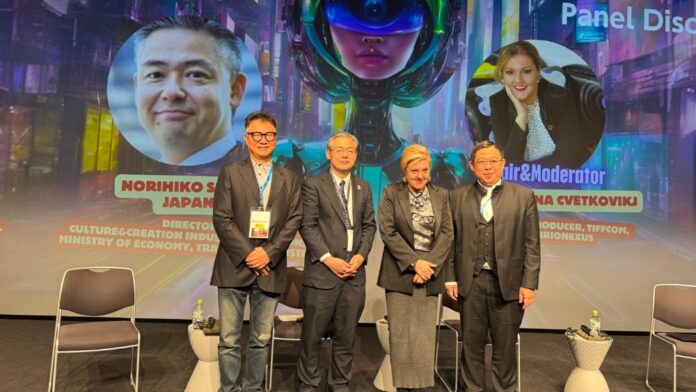Asian film and tech leaders gathered at TIFFCOM, the market allied to the Tokyo International Film Festival, to discuss the transformative impact of generative AI on film production. They highlighted its potential for dramatic cost reductions and new investment opportunities.
Kevin D.C. Chang, AI director and CEO of Metavision Co., South Korea, demonstrated how AI tools helped him reduce a $4.1 million production budget to approximately $400,000 for “Cinque Terra,” a film set across five international locations. “I made it in my computer and by myself. I made music, I made sound design, I did everything,” Chang said, noting that AI eliminated traditional location shooting costs while maintaining production quality.
The cost efficiencies are attracting new categories of investors, according to Nicholas Khoo, chair of the digital media investment committee at Singapore’s N PrimePartners Capital. “When you lower cost and time to market, you’re technically lowering the risk. And in the investment world, when you lower the risk, the amount of investment goes up,” Khoo explained. He cited examples of individual investors in Singapore now putting $5,000-$15,000 into film projects – small amounts previously unheard of in traditional film financing.
However, Khoo cautioned that due diligence remains challenging in AI investments, particularly in assessing competition. “The biggest challenge is who else is working on this that may be better than what you’re doing,” he said, noting the rapidly evolving landscape.
The Japanese government is taking steps to support AI adoption in content creation. Norihiko Saeki, director at Japan’s Ministry of Economy, Trade and Industry, revealed that the ministry has launched the GENIAC (Generative AI Accelerator Challenge) program and is developing guidelines for AI use in content production. “We are trying to promote collaboration between animation companies and cutting-edge technology companies,” Saeki said.
The technology is also breaking down barriers in international co-production. Chang, who runs weekly AI seminars for Korean filmmakers, noted that cloud-based AI tools allow real-time collaboration across borders. “We can communicate anywhere, everywhere, anytime,” he said, contrasting this with traditional film production methods that have been “way behind” in adopting remote collaboration tools.
The discussion was moderated by Andrijana Cvetkovikj, executive producer at TIFFCOM, who noted the industry must balance innovation with addressing potential risks to artists and traditional filmmaking processes.

